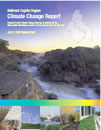



Air Quality
Climate Change Report Draft Released
New Air Quality Particulate Plan ApprovedMarch 2008 - The Metropolitan Washington Air Quality Committee (MWAQC) has approved a new air quality plan to reduce fine particle pollution in the region. MWAQC’s new plan goes beyond Clean Air Act requirements in an effort to gain further reductions in fine particle pollution. Fine particle pollution is a mixture of microscopic solids and liquid droplets suspended in air. At 2.5 microns in diameter, the small particles can get deep into lungs and even the bloodstream. People with heart or lung disease, older adults and children are at greater risk from this type of pollution. The plan, adopted March 7, 2008, will be submitted by the states to EPA to meet the April 5, 2008 deadline. The plan is available on the COG website. Fourth Edition of Air Quality Newsletter Released
MWAQC Releases New Air Quality Plan for CommentJanuary 2008 - the Metropolitan Washington Air Quality Committee (MWAQC) has approved for comment an air quality plan to reduce fine particle pollution in the region. Fine particle pollution is a mixture of microscopic solids and liquid droplets suspended in air. At 2.5 microns in diameter, the small particles can get deep into lungs and even the bloodstream. People with heart or lung disease, older adults and children are at greater risk from this type of pollution. View the press release for more detail. The states' comment period will end with public hearings in the region January 28 - February 11. View the flyer for exact times. The plan is available on the COG website for review. Comments may be submitted via e-mail. New Air Quality Plan ApprovedMay 2007 -On May 23, the Metropolitan Washington Air Quality Committee (MWAQC) approved its air quality plan for the region, paving the way for state air agencies to submit the plan to the U.S. Environmental Protection Agency (EPA) for approval. The Plan, called a State Implementation Plan (SIP), presents air quality data showing the region will meet the federal standard for ozone -- a harmful gas formed when the sun heats polluted air -- by the fall of 2009. Board approval of the plan followed a 30-day period for public comment that ended in April. Today's decision comes at the start of ozone season, when air quality forecasts are available daily. You may view the plan. Citizen Advisory Committee Members NeededApril 2006 -The Air Quality Public Advisory Committee (AQPAC) advises the Metropolitan Washington Air Quality Committee (MWAQC) on public air quality education and outreach efforts, as well as providing input into the Washington DC area air quality planning process. AQPAC's membership includes organizations chosen by MWAQC to represent geographic communities across the metropolitan Washington region. AQPAC has several membership openings to represent the residents of rural Virginia, urban Virginia, rural Maryland, and the District of Columbia, as well as openings to represent a business/industry and an environmental/health organization. If you're interested in local air quality issues and want to have a voice in the local policy process, we would be interested in hearing from you. To learn more about AQPAC visit its home page. If you are interesting in applying, please contact the AQPAC Chair, Jill Engel-Cox.
|
View Air News ArchiveEPA Approves Portion of SIPJanuary 12, 2005 - In January EPA approved the Washington region’s Rate of Progress portion of the recently submitted “Severe Area SIP.” The approval includes approval of the contingency measures, transportation control measures, VMT offset analysis, and control measures, including voluntary measures. EPA expects to act on the attainment demonstration portion of the SIP in the next month. View the Federal Register notice of EPA’s proposed approval. Designation of Non-Attainment for Fine ParticlesApril 5, 2005 - On April 5, 2005, the Washington, DC region’s designation as nonattainment for fine particles (PM2.5) became effective. The counties and cities included in the Washington, DC-MD-VA PM2.5 nonattainment area are the District of Columbia, Northern Virginia (Fairfax, Arlington, Prince William, Loudoun Counties, and the cities of Alexandria, Fairfax, Falls Church, Manassas and Manassas Park, and the Maryland counties of Charles, Frederick, Montgomery and Prince George’s. EPA still plans to issue guidance for implementing the new standard. Visit the EPA Fine Particle (PM 2.5) Designations page for more information. EPA Action on Region's Air Quality PlanMay 13, 2005 - EPA approved the Virginia and District of Columbia 's one-hour ozone air quality plan (“Severe Area SIP”) to meet the Clean Air Act requirements for a severe ozone nonattainment area. EPA disapproved the Maryland plan with a protective finding for the mobile emissions budget, so the budget can be used for determining conformity for the Transportation Improvement Plan (TIP). EPA plans to revoke the one-hour standard on June 15, 2005. The Metropolitan Washington Air Quality Committee (MWAQC) is developing a new air quality plan to meet the 8-hour ozone standard. The Metropolitan Washington region was designated as in moderate non-attainment of the 8-hour ozone standard and has a deadline of June 2010 to meet the new ozone standard. Visit the SIP page for more EPA rulings.
|
MWCOG.org - Homepage | Search
Transportation | Environment | Health & Human Services | Housing & Planning |
Homeland Security & Public Safety | Cooperative Purchasing | Publications |
Events Calendar | Committee Business | News Room | About COG |
Doing Business With COG | Human Resources | Contact Us | Site Map | Privacy Policy
METROPOLITAN WASHINGTON COUNCIL OF GOVERNMENTS |
777 North Capitol Street, NE • Suite 300 • Washington, DC 20002 Phone: 202.962.3200 • Fax: 202.962.3201 |

